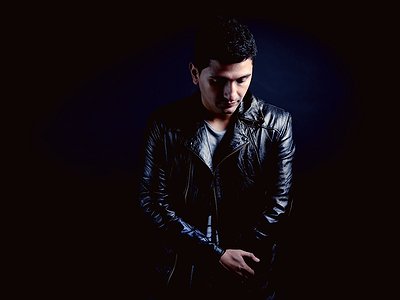Part 1
Name: Shlomi Aber
Nationality: Israeli
Occupation: DJ, Producer
Labels: Be As One Imprint, Ovum, Renaissance
Musical Recommendations: Yotam Avni, Konplott
When did you start DJing - and what or who were your early passions and influences?
I started at a very young age, I would say at around 11-12 years. I only have vague memories of my bar mitzvah, but I do remember that the only thing I cared about was the DJ and the equipment he used. I've always admired music as a form of art and always wanted to be part of it .. or rather, the other way around: to make it part of me.
For most artists, originality is first preceded by a phase of learning and, often, emulating others. What was this like for you? How would you describe your own development as an artist and the transition towards your own style?
It wasn't easy finding musical influences at such a young age in a small town in Israel. The Internet wasn't even there yet – at least not the way it is today anyway- and being too young to go out clubbing, my only influences were the radio and the mixtapes/CDs I could put my hands on. Later, with time, I was formed by listening to other DJs and records that literally changed the way I feel and think about music.
A few years later, I was already running a record store and as such exposed to a large variety of music, labels and producers. Maybe that's why, as a DJ, I don't want to commit to just one specific sound … I like all the fishes in the sea .. it makes the view much more interesting .
What were some of the main challenges when starting out as a DJ and how have they changed over time? What is it about DJing, compared to, say, producing your own music, that makes it interesting for you?
I'm a DJ first, then a producer. DJing was my first passion and it still gets me excited the same way it did 20 years ago. It was hard to break through from the place I started out from, a young boy from a small town in the South of Israel, nothing fancy. Some have referred to it as a “cindarela story” in a way, but I never really liked that quote. It's not a case of luck and finding a lost shoe - just a lot of hard work and ambition.
What was your first set-up as DJ like? How has your set-up evolved over the years and what are currently some of the most important pieces of gear for you?
It's funny, as the ball is rolling, we are going back to basics, just like in real life. I went from vinyl to CDJs to timecode computers and back to vinyl again. It's is still where I feel most comfortable. The best music out there these days is made on vinyl, and at the end of the day, that's the purpose these media are made for: To play the best music out there .
Currently, I'm hooked on the latest Pioneer fx machine, RMX – 1000. It's a great tool to turn any loop or even an average record into a winner.
How do you see the relationship between the tools you're using and the creative results – in which way do certain tools suggest certain approaches, in which way do they limit and/or expand your own creativity? Do you believe in the idea of progress in DJing from a technological perspective?
This brings us back to the previous vinyl statement. It's very challenging to keep track of all the latest technologies and personally, I've always been the last one to jump on them. I'm one of those who can use the same software for many years without upgrading it, just because I believe that you shouldn't fix what ain't broken. For example, I used to produce comfortably on Cubase 3 for so many years before I lately finally upgraded to 7. I've just never been inspired by technology per se – the only thing that matter is how can it make my DJ sets or productions better.
Could you take me through the process of preparing for one of your gigs, please?
I never do any pre-planning for a show. It takes the soul out of the this magical moment when you're standing in front of the crowd and wonder how you can surprise them next. It's fun and inspiring to discover, just like the audience in front of you, what's going to be the next record right on that spot. You can not “pre-plan” such a moment - and you cannot surprise yourself otherwise.
What constitutes great mixing from your point of view?
Tricky question. Each of us has his own character and way of seeing things. It's like looking at a painting and deciding if it's good or not. We can not judge art using algebra. Therefore, there is no definitive way of judging what's good with music. I can judge only from my point of view and I will say that a good mix kicks you out of the club overwhelmed, regardless of who the DJ was or how he played. If you're leaving the club with a feeling of satisfaction from the musical journey, it means you've been to a good DJ set.
How would you describe your approach to building a set? What are some of the characteristics that define who you are as a DJ?
I'm very versatile as a DJ. I can play very German- or Detroit techno as much as I can play house or acid. I don't like to play more than 3-4 tracks in the same direction and need to take a break for something that shifts the mood - although there will always be the groove and the funk.






